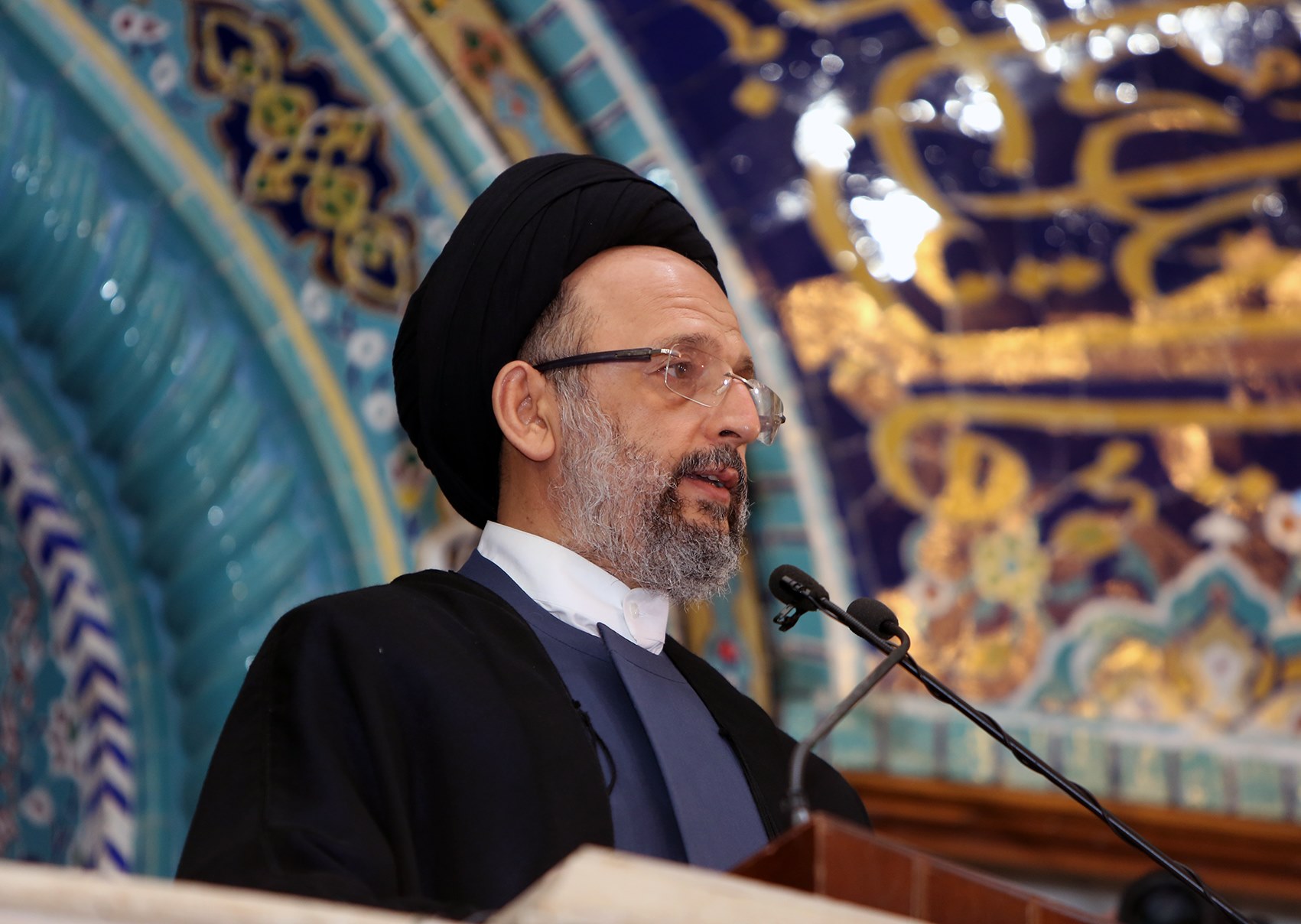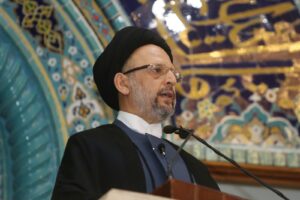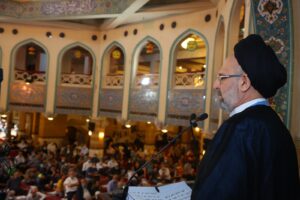Trial in good and evil
The first sermon
Allah, The Most Exalted, says in His Glorious Book: Every soul will taste death. And We test you with evil and with good as trial; and to Us you will be returned. Allah, The Most Exalted, speaks the truth.
The concept of trial is associated, in the minds of most people, with poverty, weakness, sickness and loss of loved ones. That is why it is said that someone is tried when he loses his money or loved one , as well as when he becomes sick or when he loses his work or source of living… But it is rarely associated with becoming rich or holding a high position or when Allah, The Most Exalted, gives one a child or good health …etc.
Is this understanding of the concept of trial correct? The Holy Quran did not adopt this meaning of the term. According to it, trial is not restricted to grievances; it also includes what God bestows on His servants of good. This is what the Ayat we recited (And We test you with evil and with good as trial) indicate. He also says in another Ayat: And We tested them with good [times] and bad that perhaps they would return [to obedience].
Allah, The Most Exalted, also refers to the same theme in another Surah, when He says: And as for man, when his Lord tries him and [thus] is generous to him and favors him, he says, “My Lord has honored me.” But when He tries him and restricts his provision, he says, “My Lord has humiliated me.” Thus, trial includes both giving and restriction. And this is what Prophet Sulaiman understood when Allah, The Most Exalted, gave him a vast realm He did not give to anyone after him: “This is from the favor of my Lord to test me whether I will be grateful or ungrateful”.
Thus, trial is not the image that has been drawn in the minds of people; an image of evil and suffering. It is also one of good and opportunities. That is why it is said that trial is a test.
In God’s view man is tested when he suffers from catastrophes and grievances, but he is also tested when he is given good. And on the basis of this test the truthfulness of his belief will be determined. This what the following Ayats say: Alif, Lam, Meem
Do the people think that they will be left to say, “We believe” and they will not be tried?
But We have certainly tried those before them, and Allah will surely make evident those who are truthful, and He will surely make evident the liars. And this what Imam Ali (a.s.) pointed at when he said: Now, Allah, the Glorified, has made this world for what is to come hereafter, and has put its inhabitants to trial as to which of you is good in action.
The Holy Quran considered that passing the test of disasters is attained by patience, resoluteness and not panicking.
And this is what Allah, The Most Exalted, pointed at in His saying: And We will surely test you with something of fear and hunger and a loss of wealth and lives and fruits, but give good tidings to the patient, who, when disaster strikes them, say, “Indeed we belong to Allah, and indeed to Him we will
Those are the ones upon whom are blessings from their Lord and mercy. And it is those who are the [rightly] guided.
On the other hand, He considered their success when given good depends on their thankfulness to God and on not being arrogant or exploiting their power or their wealth in corruption and oppression, as Pharaoh , Haman and Qaroun… did. He has to see what he has been given not as a privilege, but as a responsibility, he will be accounted for on the Day of Judgment.
The Hadith says that Allah, The Most Exalted did not bestow any of His graces on any of His servants without binding it with a duty in return. If he is wealthy he should give the poor and the needy, and if he is powerful he should not oppress those who are weaker than him, and if he is beautiful and honorable he should thank God and not deny the weak their rights…
That is why the Messenger(p.) Considered that the believer is in a good state in all conditions whether in distress or in wealth and happiness. If he is given good he would be thankful which is good for him and if he passes through a crisis he would be patient which is also good for him.
The question that is raised here is whether it is Allah, The Most Exalted, Who imposes both good and evil (disasters and calamities) on man. This is not true. For Allah, The Most Exalted, has made a cause for everything. The one who would follow the reasons (laws) that would lead to attaining the good will reach his end, while those who adopt the path that lead to trouble and crisis will also reach them.
As for why they are attributed to Allah, The Most Exalted, it is because the movement of life in its entirety is in His hands.
Dear loved ones: let us rise to the level of confronting the challenges that are facing us whether those of good or those of evil .Let us succeed in the test of life in all its conditions. And let our prayers be: Our Lord, let not our hearts deviate after You have guided us and grant us from Yourself mercy. Indeed, You are the Bestower.
The second sermon
Worshippers of Allah, The Most Exalted: I advise you and myself with what Allah, The Most Exalted, commanded us, when He said: O you who have believed, be persistently standing firm in justice, witnesses for Allah, even if it be against yourselves or parents and relatives. Whether one is rich or poor, Allah is more worthy of both. So follow not [personal] inclination, lest you not be just. And if you distort [your testimony] or refuse [to give it], then indeed Allah is ever, with what you do, Acquainted.
Allah, The Most Exalted, wants us to be just and say the truth and stand firm with justice even it be against ourselves, parents , relatives or those we love.
By this, we realize what Allah, The Most Exalted, wants us to accomplish in life: to establish justice, end all wronging and build life on this basis, which would enable us to continue, survive and face challenges.
We begin by Lebanon where fear from the Coronavirus has increased as a result of the horrifying rise in the number of those infected. Thus, we have to remind those living in Lebanon and those coming from abroad, yet again, that it is necessary to abide by the protection measures and ask the government to be strict in observing them.
At the same time, the Lebanese continue to suffer from the rise in the price of the dollar and that of the basic food commodities, as well the rationing of power that might reach full blackout and the fuel crisis. The crises might also reach the health sector, especially after the hospitals announced that they might no longer be able to host patients.
Here comes the responsibility of the government which has to hasten to take the measures that relief the country from these crises, especially after it has become clear the scope of the threat of the continuous decline of the present living conditions poses on the domestic stability and after frustration and despair have led some people to commit suicide.
This does not mean that we deny that the government have taken some moves in this respect, such as the food basket which he had hoped that it would have subsidized all basic food items, and which we fear that the greed of merchants and monopolizers would abort it.
Nevertheless, despite the importance of this step, it remains a sedative, since it does not deal with the deep causes of the crises. The main thing the government, with the collaboration of the parliament, has to do is to speed up the reforms that regains the trust of the citizens in their government , as well as the effective countries in the world that wish to help Lebanon… And we have lately heard some of them calling on the Lebanese to help themselves so that they can help them.
In this respect, we want this government in its appointments of first-category and high-ranking state positions not to resort on sectarian and partisan considerations. If the government has based its appointments on the criterion of qualification, it has to declare them in a transparent way to face all the accusations that were raised.
It has become clear that there are some people who were skeptical, but these raised doubts should not become an obsession on the part of the government. Instead, they should act as an incentive that drives the government to work more. We are sure that the Lebanese who are used to the support of the external forces will not wait for these forces to solve their crises when it is at the expense of their dignity and integrity.
We believe that they will not concede their dignity and that of their country in return for any kind of aid. Moreover, this is not an option. It is duty that they have undertaken in the past and made many great sacrifices to preserve.
Furthermore, we would like to emphasize that we stand with any country in the world that wishes to help us without extorting Lebanon in its security, independence and sovereignty.
Nevertheless, the most important thing is self-reliance, through a productive economy.
Yet this cannot be achieved, unless we secure the infrastructure of water, roads and electricity and subsidize raw materials and protect our production from foreign competition, as well as find export markets, which we still lack.
It has become clear that Lebanon is capable of overcoming its crises, but this will not be accomplished as long as the Lebanese state does not forego the mentality of the farm and adopt the mentality of the state of citizenship.




